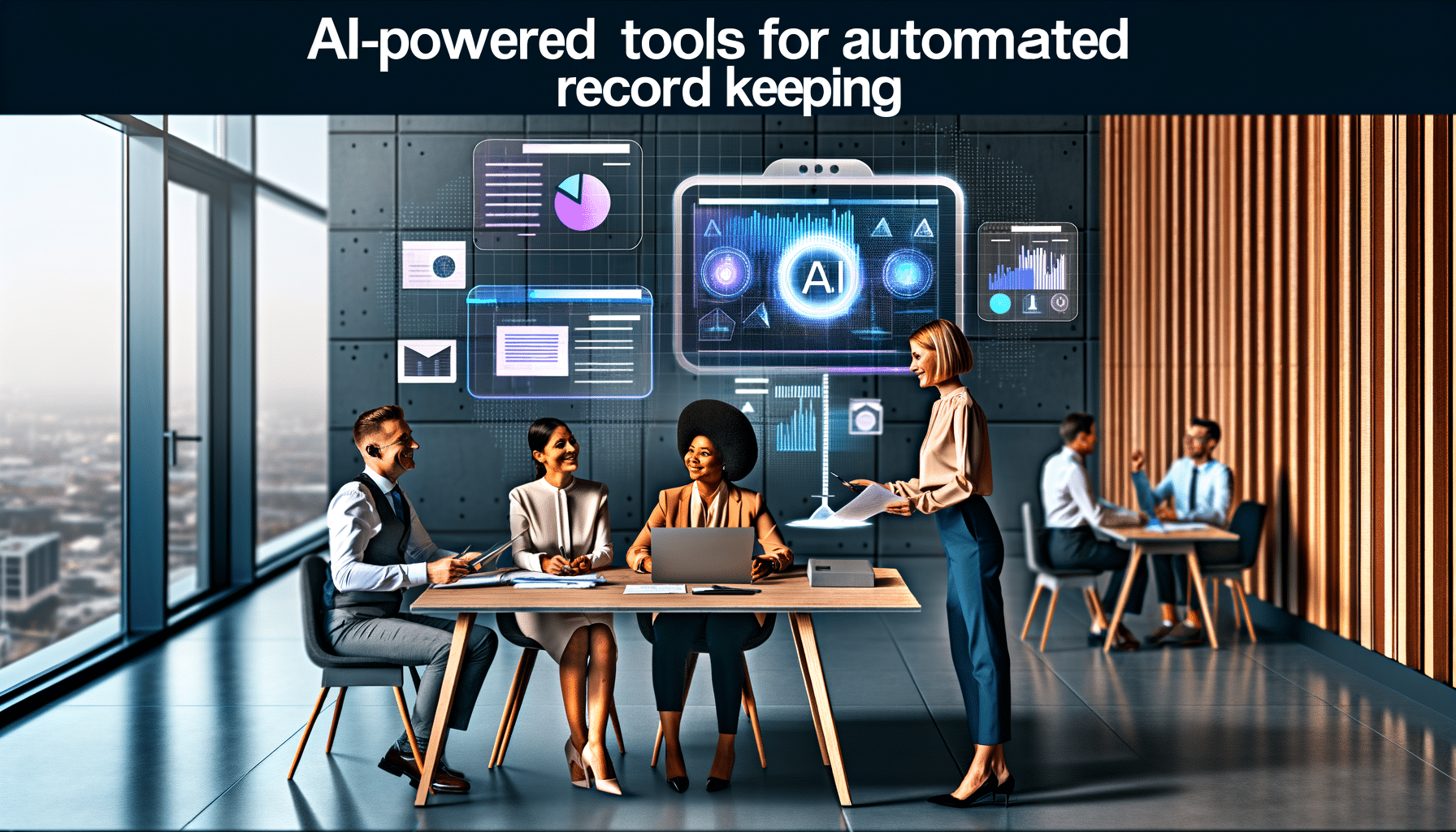- AI Tools
- April 1, 2023
AI-Powered Tools for Automated Record Keeping

Revolutionizing Record Management: The Role of AI in Automated Record Keeping
In today’s fast-paced business environment, efficiency isn’t just a luxury—it’s a necessity. Record keeping, once an obligatory and time-consuming task, has received a major overhaul thanks to AI tools. As a founder deeply entrenched in merging cutting-edge technology with practical business needs, I have witnessed how AI can transform record management into a streamlined, strategic advantage.
Why Traditional Record Keeping No Longer Suffices
Traditional record keeping methods are manual and prone to human errors, inefficiencies, and security vulnerabilities. When we consider industries like healthcare, finance, or legal sectors, where precision and confidentiality are paramount, the limitations of traditional methods become glaringly apparent. This is where AI tools in automated record keeping come into play, acting as the keystone for futuristic, fluid management systems.
The Emergence of AI in Record Management
AI tools are designed to remove the drudgery often associated with record keeping. Their ability to automate mundane and repetitive tasks means that businesses can redirect their human resources to more strategic initiatives. Here’s how AI-powered records management efficiency is achieved:
Categorization and Retrieval
One of the quintessential advantages of AI in record management is its prowess in categorization. AI tools automatically classify and tag records using sophisticated algorithms, allowing retrieval through intuitive, natural language queries. This means no more endless searching for files; data becomes accessible within moments, enhancing overall efficiency.
Enhanced Security and Compliance
Automated record keeping with AI tools is not just about efficiency; it’s also about security. Secure Data Rooms provided by AI platforms offer controlled access to sensitive files, coupled with real-time activity tracking. Moreover, regulatory workflows can be automated to ensure adherence to standards like GDPR, HIPAA, and SOX, offering peace of mind in compliance management.
Why Businesses Should Embrace AI-Powered Tools
The benefits of adopting AI tools in record management are manifold.
- Increased Accuracy: AI, with its predictive capabilities, significantly reduces the likelihood of human error.
- Cost Savings: By automating repetitive tasks, companies can reallocate their budget to areas that require human creativity and judgment.
- Time Efficiency: Quick data retrieval and simplified compliance translate into hours saved, which can be reinvested into core business activities.
- Data Integrity: Blockchain integration ensures that records are tamper-proof, offering a layer of security that traditional methods simply cannot.
Real-World Applications and Success Stories
At RecordsKeeper.AI, I’ve had the privilege of helping organizations across various sectors implement AI tools for record keeping. One such example is a mid-sized healthcare provider that switched from paper-based records to our AI-powered platform. This shift resulted in a 40% increase in operational efficiency within the first year, allowing the organization to focus more on patient care rather than paperwork.
Preparing for the Transition
While the benefits of AI tools are substantial, transitioning from traditional record keeping to an automated system requires careful planning. Here are a few steps to ensure a smooth transition:
- Evaluate current record-keeping processes to identify areas needing improvement.
- Engage with all stakeholders to ensure everyone understands the benefits and logistics of the transition.
- Invest in training programs to help your team become comfortable with new AI technologies.
- Monitor and review your system regularly to make any necessary adjustments.
The Future of Record Management
The integration of AI tools into record management systems is not a passing trend—it’s the future. As data continues to grow exponentially, the demand for efficient and secure record-keeping solutions will only increase. Businesses that adopt these technologies early on will have a strategic advantage over their competitors, bolstered by increased efficiency and a focus on core business objectives.
Conclusion
In my journey with RecordsKeeper.AI, I’ve seen firsthand how AI-powered tools for automated record keeping can transform an organization’s operations. If you are looking to modernize your record management approach efficiently, now is the time to explore AI. Not only will you meet the demands of today, but you will also be prepared for the challenges of tomorrow.
I encourage you to delve deeper into the possibilities AI presents in streamlining your operations. Feel free to reach out or follow me for more insights into how technology can reshape your business landscape.
Toshendra Sharma is the visionary founder and CEO of RecordsKeeper.AI, spearheading the fusion of AI and blockchain to redefine enterprise record management. With a groundbreaking approach to solving complex business challenges, Toshendra combines deep expertise in blockchain and artificial intelligence with an acute understanding of enterprise compliance and security needs.
Related Posts

Optimizing Financial Workflow with AI-Driven Tools
Learn about AI tools designed to streamline financial workflows.
- April 12, 2024

Top 5 Tools for Automating Document Storage and Retrieval
Discover the best tools to automate document storage and retrieval processes.
- October 9, 2022
Archives
- December 2024
- November 2024
- October 2024
- September 2024
- August 2024
- July 2024
- June 2024
- May 2024
- April 2024
- March 2024
- February 2024
- January 2024
- December 2023
- November 2023
- October 2023
- September 2023
- August 2023
- July 2023
- June 2023
- May 2023
- April 2023
- March 2023
- February 2023
- January 2023
- December 2022
- November 2022
- October 2022
- September 2022
- March 2019
Want to get more content like this?
Signup to directly get this type of content to your inbox!!
Latest Post
Organizing External Auditor Access
- December 22, 2024
Document Control in Manufacturing Plants
- December 21, 2024
Handling Rush Financial Report Requests
- December 20, 2024
Managing Record Access After Staff Changes
- December 19, 2024





